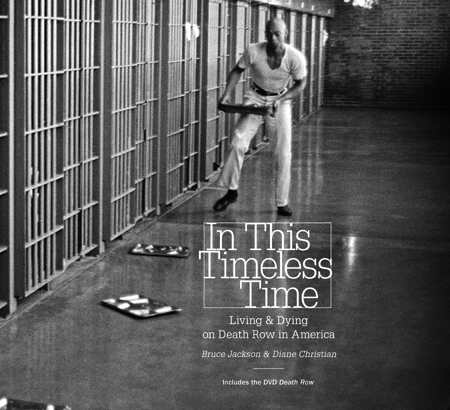In This Timeless Time
Living and Dying on Death Row in America
Life as we know it ceases on death row. Instead, DR prisoners struggle to survive in what one-time inmate, now paroled, Donnie Crawford calls “timeless time,” a surreal existence of suspended life that begins with the death sentence and ends with a reduced term, parole, or execution. Bruce Jackson, James Agee Professor of American Culture at the University at Buffalo, is the author of thirty-five books and the coproducer of five documentary films, and Diane Christian, SUNY Distinguished Professor, is a religious scholar who studies violence in America. This husband-and-wife team powerfully describes the death row experience through photographs, narrative, and, most importantly, the inmates’ own words. An accompanying DVD of a documentary made in 1979 remains timely.
Jackson uses his forty years of experience studying prisons to gain the cooperation of the administration and death row inmates of Ellis Prison in Texas. The prisoners describe their lives of noisy isolation, in which they are separated from each other but must endure the continuous din of eight televisions and radios until night, when silence is broken by screaming inmates yelling at imaginary people. Convicts are only allowed to socialize outdoors during brief recreation periods, which might be suspended for months due to cold weather or rain. The now outlawed system of using prisoners not on death row as trustees to control the inmates often led to brutal beatings and rapes of those on death row.
The book’s most chilling aspect is the photographs of twelve inmates who were executed. Since 1974, one-half of the nation’s twelve hundred executions have taken place in Texas, Virginia, and Oklahoma, with more executions occurring in Harris County, Texas, than in any other state. Several stories describe what the authors call the “awful” legal representation provided for capital crime defendants; the inference is that some of the inmates may have not have received death sentences if they were defended by competent, better-compensated attorneys who met with their clients for more than a few hours.
This book argues persuasively for the end of capital punishment, which, the authors conclude, has not deterred murders and has resulted in deaths from unfairly, if not unconstitutionally, rendered verdicts. All readers concerned about the US prison system and capital punishment will benefit from this important work.
Reviewed by
Karl Helicher
Disclosure: This article is not an endorsement, but a review. The publisher of this book provided free copies of the book to have their book reviewed by a professional reviewer. No fee was paid by the publisher for this review. Foreword Reviews only recommends books that we love. Foreword Magazine, Inc. is disclosing this in accordance with the Federal Trade Commission’s 16 CFR, Part 255.

